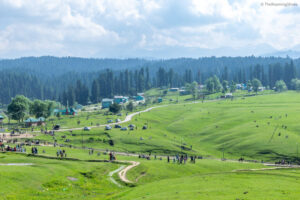The Rising Power of Public Opinion: Shaping Global Politics and Social Change

group of people holding hands and feeling together, arms raised in the sky, freedom, friendship and unity concept.
By| Farooq Ahmad Lone
Man is both a social and thinking animal, constantly forming opinions on the world around him. In today’s democratic age, where freedom of speech is a fundamental right, people are not only able to form opinions but also express them. Whether through speech or writing, individuals are encouraged to share their views on a range of issues, both local and global. As more people voice their thoughts, a collective opinion emerges on various topics. This aggregation of individual perspectives is what we know as public opinion. Public opinion refers to the general views held by the public on specific issues, and it has become a powerful force in shaping contemporary global developments.
In the modern world, public opinion holds tremendous significance in both domestic and international politics. Governments, whether local or global, must take into account the views of their people when formulating policies. Domestically, public support is essential for the success of government initiatives, while internationally, the approval of the people can influence a country’s stance on foreign issues. Public opinion can either enhance a state’s ability to act or hinder its effectiveness. When public sentiment aligns with state policies, it provides the government with legitimacy. However, when public opinion turns against the state, it can create resistance, often leading to the weakening of the ruling regime or the failure of certain policies.
Public opinion is not only a domestic tool but also a driving force behind global movements. Issues such as climate change, human rights, and gender equality have seen a significant rise in global awareness, largely due to the growing support from the public. The collective voice of the people in both the Western and Eastern worlds has pushed governments to act on these critical issues. In the age of globalization and digital communication, these movements have gained unprecedented momentum. The widespread support for causes like reducing global warming, protecting human rights, and advancing gender equality has forced world leaders to address these concerns in global forums such as the United Nations.
The power of public opinion can also be seen in the liberation struggles of nations. In South Africa, for example, the global outcry against apartheid, fueled by public opinion worldwide, played a significant role in dismantling the racist regime. The international sanctions and the global condemnation of the apartheid government were driven by public support for the Black population, demonstrating how public sentiment can challenge even the most entrenched systems of oppression. This is a clear example of how global public opinion can influence a nation’s policies, often leading to significant political and social change.
Today, we are witnessing a shift in public opinion concerning the Palestinian issue. Historically, Western countries, especially the United States, have supported Israel, but this position is being increasingly questioned, particularly by younger generations. Generation Z, more attuned to issues of human rights and social justice, has shown strong support for Palestinians and their struggle for self-determination. This shift in public opinion is becoming evident through widespread protests, particularly in Western universities, where students are demanding their governments to reassess their stance on Israel and act in defense of Palestinian rights.
The recent humanitarian crisis in Gaza has further amplified global support for Palestine, particularly in the Western world. For the first time in history, large numbers of citizens in the U.S. and Europe have actively protested against their governments’ support for Israeli actions. This growing public pressure is creating a noticeable divide between public sentiment and government policy. The shift in public opinion on this issue is not isolated to one region but is a part of a broader movement, with growing sympathy for the victims of colonialism and oppression across the globe. This change in attitudes signifies that public opinion can have a profound impact on international relations and foreign policy, particularly in the West.
As the global landscape continues to evolve, public opinion is poised to play an increasingly critical role in reshaping the international order. The global South, long marginalized by Western dominance, is demanding an end to neo-colonialism and a more just global system. The voices of ordinary citizens, empowered by digital platforms and social media, are pressuring governments to change their policies. Analysts predict that public opinion will be a decisive factor in ending the dominance of Western powers in global politics, leading to the creation of a fairer and more balanced international world order. This growing momentum suggests that the future will be shaped by a more inclusive and equitable global political system.
Looking ahead, we can remain optimistic about the future, as the increasing influence of public opinion promises a more just world. The interconnectedness of today’s global society and the growing awareness of social justice issues indicate that public sentiment will continue to drive positive change. Whether addressing global environmental concerns, advocating for human rights, or challenging political oppression, the collective power of public opinion is set to play an even more significant role in shaping global developments in the years to come. The future, shaped by the voices of the people, holds the potential for a more fair and just international order.
Author’s: Farooq Ahmad Lone writes on international relations and has completed BA. He can be reached at lonefarooqahmad80@gmail.com



